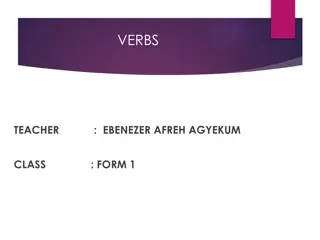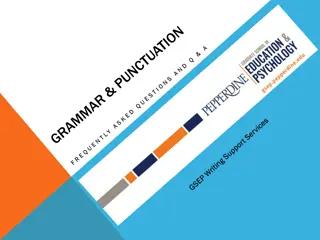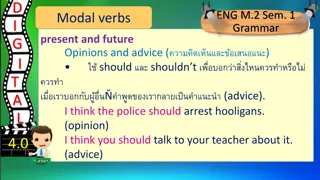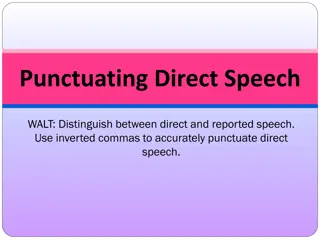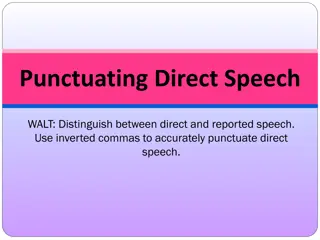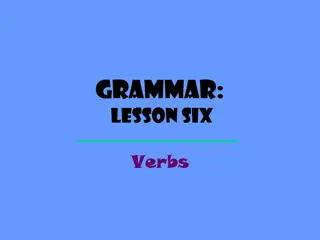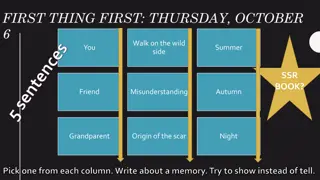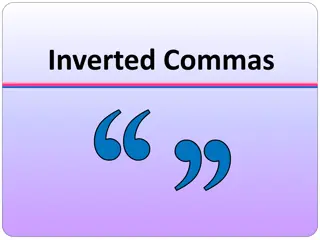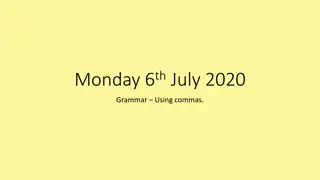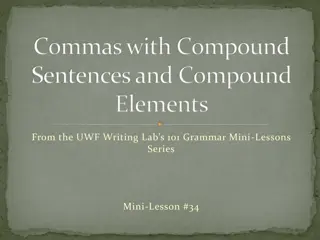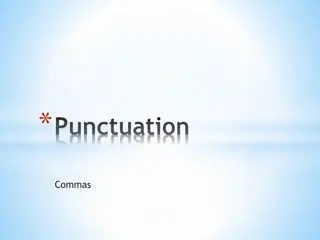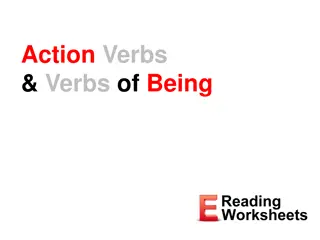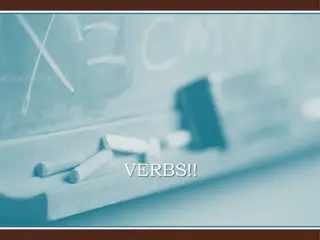English Grammar Lesson on Changing Reporting Verbs and Inverted Commas
This English grammar lesson covers changing reporting verbs and inverted commas, focusing on direct and indirect speech transformations. Students learn how to alter reporting verbs and punctuations in sentences. The lesson includes various examples and explanations for better understanding.
Uploaded on Jul 17, 2024 | 2 Views
Download Presentation

Please find below an Image/Link to download the presentation.
The content on the website is provided AS IS for your information and personal use only. It may not be sold, licensed, or shared on other websites without obtaining consent from the author.If you encounter any issues during the download, it is possible that the publisher has removed the file from their server.
You are allowed to download the files provided on this website for personal or commercial use, subject to the condition that they are used lawfully. All files are the property of their respective owners.
The content on the website is provided AS IS for your information and personal use only. It may not be sold, licensed, or shared on other websites without obtaining consent from the author.
E N D
Presentation Transcript
Introduction Md. Shamim Hossain Assistant Teacher Victoria High School Sirajgonj
Text introduction Level: Class:9-10 Subject: English Gramar and Composition Main Lesson: Unit-13 Page No. 191 Time: 40 m.
What we can see in the picture and What can we guess?
Narration class no: 03
Learning Outcomes: At the end of this lesson, the students able to discuses : How to change reporting verb in the speech ? How to change inverted comma in the speech?
Changing reporting verb and inverted comma. Sentence Direct of Indirect of reporting verb Said /told That Alternate of inverted comma reporting verb Assertive Said Interroga tive Said Asked If / wh:
Changing reporting verb and inverted comma. Sentence Direct reporting verb Indirect reporting verb Alternate of inverted comma Imperative Said Ordered / Commanded Advised Requested Forbade Proposed / suggest To / That (let s)
Changing reporting verb and inverted comma. Sentence Direct reporting verb Indirect reporting verb Alternat e of inverted comma That Optative Said Prayed / wished Exclamatory Said How/ what = exclaimed with wonder Alas = exclaimed with sorrow Hurrah = exclaimed with joy Fie, fie = exclaimed with shame. That
D : He said to me, I am writing a letter now . Ind : He told me that he was writing a letter then . D : The old man said to me, Can you give me some food? Ind : The old man asked me if I could give him some food. D: I said to the old man, why do you beg? Ind: I asked the old man why he begged.
D: He said to me , open the door. Ind: he ordered me to open the door. D: The Captain said to the solders, Fire on. Ind: The Captain commanded the solders to fire on. D: The teacher said to the boy, Learn to be honesty from your boyhood. Ind: The teacher advised the boy to learn to be honesty from his boyhood.
D: He said to me, pleasegive me a pen. Ind: He requested me to give him a pen. D: He said to me, Don t hate the poor. Ind: He forbade me not to hate the poor. D: I said to him, let s go out. Ind: I proposed to him that we should go out
D: I said to him , May Allah help you. Ind: I prayed him that Allah might help him. D: Father said to me, May you pass in the exam. Ind: Father wished me that I might pass in the exam.
D: Salma said, How nice the bird is ! Ind: Salma exclaimed with wondered that the bird was very nice. D: She said , Alas ! I am undone. Ind: She exclaimed with sorrow that she was undone. D: karim said , Hurrah ! We have won the game . Ind: karim exclaimed with joy that they had won the game. D: I said to him, Fie fie ! You are very bad. Ind: I exclaimed with shame that he was very bad.
Evaluation D : He said to me , Can you help me? D: She said , Alas ! I am fail. D: He said to me, Please give me a book.
Answer: D : He said to me , Can you help me? Ind : He asked me if I could help him. D: She said , Alas ! I am fail. Ind: She exclaimed with sorrow that she was fail. D: He said to me, Please give me a book. Ind: He requested me to give him a book.
Home work Classification of Adverb.
Thank you



